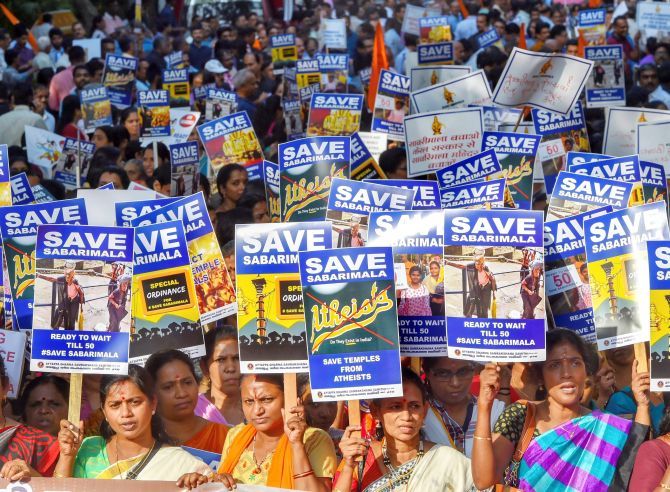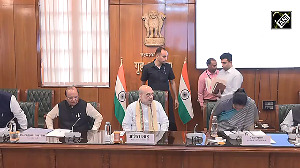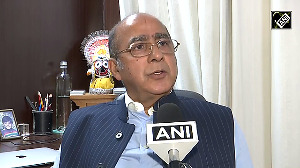'It is exceptionally important for Hindus to once again get in touch with the foundation of Hinduism.'
'Aggressive evangelists are reducing Hinduism to its lowest common denominator.'

Ambassador Pavan K Varma, retired diplomat, former member of Parliament and national spokesperson of the Janata Dal-United, is a scholar and among the rarest of rare politicians who can discuss Hinduism threadbare and at length.
His latest book Adi Shankaracharya -- Hinduism's Greatest Thinker, examines the legacy of the 8th century Hindu seer who revived Hinduism after the rise of Buddhism and Jainism established four mutts (monasteries) across India in Dwarka (Gujarat), Jagannath Puri (Odisha), Sringeri (Karnatakaa) and Joshimath (Uttarakhand).
"Hinduism as a religion cannot be separated from Hinduism as a philosophy and if you are unaware of that philosophy, you will fall prey to Hinduism as a practice as defined by these people who know nothing about Hindu philosophy," Varma tells Rediff.com's Syed Firdaus Ashraf.
A rationalist writing a book on Adi Shankaracharya, an icon of Hinduism -- what triggered this?
There is rarely a philosophical discourse or thesis which is based on such a rational structure of thought.
In other words, this is not mythology, not obscurantism, not a chauvinistic glorification of the past, but it is the exposition of one of the finest minds developing a rigorous structure of philosophical thought based on reason and logic.
On the eclectic Upanishadic insight of 4,000 years ago, which is why if I am a rationalist on television today I have a direct correspondence with the rationalism that is an aspect of Hindu philosophy.
Adi Shankaracharya left his widowed mother, which to many could come across as not being responsible towards her. What about the dharma to take care of his mother? What does Hinduism say about it?
I think that he was torn between his duties as the only child towards his widowed mother and (spiritual urge), he did not take a unilateral decision to leave her. He waited to have her permission, as described in the book, which she gives.
And this aspect of his duties to his mother has to be balanced or seen in the perspective of a very strong desire for mumutsa (yearning to find the truth and for liberation) which was a very strong intimation, if not resolve within, to become a sanyasin.
He left his mother after her permission and went with the promise that he will be with her and especially at the time when she needs him and he does come when she is bedridden.
In a sense, he balances what he felt to be his duty with the much stronger urge to pursue a larger quest of what is the absolute truth. In which human relations do become to some manner subordinate.
To a layman, what is the Advaita doctrine and why is it so important for the Hindu way of life?
Essentially, Advaita is about not the search for God, but for the search of absolute truth.
Therefore, it is nothing short of remarkable that in Shankaracharya's philosophy and in the Upanishads you have a concept of what is the ultimate cosmic reality which is not confined to attributes which are familiar to the human category.
It is about the entity that is Brahman, which is attributeless, which is omnipotent, which is omniscient which is a drisht (vision) unseen and beyond thought, which is pure intelligence, which is undifferentiated consciousness, which is all pervasive.
Therefore, that in itself is remarkable.
From that derives an entire structure of philosophical thought that if the Brahmaand (universe) is suffused by this entity called Brahman, which is pure consciousness and which by inference is bliss, an awareness which you are entitled to if you experience it through Brahm Anubhav (experience of the Absolute), then everything else follows in terms of what is this empirical world, who am I?
Therefore the four Mahavakhyas of the Upanishads, Tat Vam Asi, you are that and not what you think what you are. Pragyanam Brahman, Ayam Atman Brahman and Aham Brahmasmi.
On that basis you build a philosophical thought.
I want to add to this what happens is that the Hindu religion is a way of life. In other words, it has no one pope, no one church, no one prescribed text, no one prescriptive ritual and no mandatory congregations.
But it is a way of life, that is the strength of the religion which is why it is sanatan anadi anant (life is cyclical). Hinduism is dialogic.
Hinduism is inclusive, assimilative and based on dialogue which is described as shastras, the ability to debate and listen to contrary viewpoints and to argue what you believe in.
It is not evangelical that is being propagated today. Therefore, it is exceptionally important for Hindus to once again get in touch with the foundation of Hinduism.
That is why I wrote this book.

You have mentioned very little about the Avarna sect in your book. Why is it so? And how did this section of society remain a part of Hinduism?
Why did they agree to be the lowest strata of Hinduism when Buddhism and Jainism were then gaining ground in India?
In fact, it is precisely the nature of Hinduism that it could allow religions like Buddhism and Jainism, which have great areas of overlap with Hinduism, to develop as different strands of thought without necessarily any violent conflict in the evolution of such a development.
It is a mythology that Adi Shankaracharya although differed with Buddhism in certain aspects. I do not believe in the hagiographical biography of Shankaracharya that he was an avatar of Shiva to destroy Buddhism.
There was at best a dialogue when Buddhism was already in decline. The principle dialogue which changed the course of Hinduism was with Mandan Mishra, who believed in Karam Kand as against Adi Shankaracharya who believed in Gyan Marg and that dialogue took place through process of shastras (or debate).
As regard to the lower castes, there is no doubt Hinduism in due course developed a very oppressive system where the Brahminical order prevailed. But credit must be given to Shankaracharya when he says that all are equal and all are emanations of the same Brahman.
There is a famous story that he came across a Chandal in Varanasi where he says you are my guru. He negates it and says go beyond jaati and caste as they have no consequences. I am neither a believer in the varna system nor teerth.
- An excerpt from Pavan K Varma's book: When Adi Shankaracharya met the chandala...
He was not a social reformer. He was a philosopher. He could conclude that certain rituals or exclusionist sects of Hinduism had no place in his structure of thoughts.
Why was Buddhism on the decline during his time?
One reason is perhaps, that there was some level of deterioration both in the intellectual calibre and practice of Buddhism in the monasteries themselves as established.
Therefore, for whatever reason Buddhism having reached a certain apogee in the time of Ashoka, subsequently went through a relative decline.
Shankaracharya is credited with the revival of Hinduism because he once again took Hinduism and linked it to its deep philosophical foundation beyond merely somewhat degenerated ritualism to which it had descended.
He said Ishwar, Bhakti, atmasamarpan and yoga, all of them are valid if they are done without thought of reward because they prepare you for that higher knowledge which is called Paramvidya, which takes you towards Brahman or allows you to experience it.
In that sense he was a great synthesiser and he revived Hinduism.
It is said Zoroastrianism as a religion was not organised and therefore it could not hold its believers, especially after the battle of Qadisiyyah when Muslims defeated the Sassanid empire.
Would Hinduism have gone the Zoroastrian way but for Shankaracharya?
I think Adi Shankaracharya's contribution in providing for Hinduism is the rigorously reasoned philosophical foundation and of reviving once again the spirit in which Hinduism first evolved from the time of the Upanishads.
The Brahma Sutras and Bhagvad Gita are the foundational text of Hinduism and that contribution can never be underestimated.
The tragedy is that most Hindus are today adrift from their own philosophical underpinnings.
If you ask a normally practising Hindu, who is Adi Shankaracharya, he may say, I know, but ask him when he was born, what he wrote, what are the six systems of Hindu philosophy, what is the Charvaka school? How many Upanishads are there? People don't know.
These are the real treasures of Hinduism.
And it is in this absence of that knowledge that we have these aggressive evangelists whose aggression is in direct correspondence with their ignorance of Hinduism.
They are reducing Hinduism to its lowest common denominator. And you cannot fight them until you go back and immerse yourself into philosophical richness of Hinduism.
Which language did Shankaracharya speak while convincing people to establish the four mutts? If I am not mistaken, Prakrit had taken strong root in India replacing Sanskrit at that time.
I think it must have been a combination of Malayalam and Sanskrit.
What is significant is that he was a travelling philosopher who did not stay in one place. He moved from Kaladi where he was born and took samadhi in Kedarnath.
Sringeri one mutt, Puri another mutt, Dwarka another mutt and Joshimath and this is the civilisational map of India.
And he undertook this journey not once, but thrice.
I would assume that apart from local languages, Sanskrit must have been known more or less across India.
Do you think these mutts helped establish some kind of organised religion, like in Islam where people look in the direction of Mecca to pray?
Is that the brilliant understanding of Shankaracharya that the mutts were important to give Hindu religion a sense of direction if it had to survive in the 8th century?
I feel Adi Shankaracharya was influenced by the creation in Buddhism of monasteries to train and develop the philosophical thought and practice of Buddhism.
I think that must have been an influencer, which is why he thought to create institutions where some of these great learnings could be preserved in an institutional manner, not through memory but in an institutional manner.
Therefore, he set up Sringeri, Dwarka, Puri and Joshimath.

Why do Marxist historians say Hinduism is a Brahminical religion, that Brahminvad has captured it?
I think to some extent the manner in which Hinduism has been practised, or the inequities that have been inflicted in the name of Hinduism by the relatively privileged, by the higher castes, especially against the lowest rung of the social ladder, which includes the Dalits, was definitely a condemnable development.
And it is for this reason that very often Leftists or critics throw the baby out with the bath water.
They say everything in Hinduism is a perpetuation only of an inequitable Brahminical order, whereas the truth is while that indeed it was present, it needs to be confronted, fought and defeated.
There was equally in Hinduism an emphatic acceptance of equality. If Brahman is attributeless as in you and me or anyone, the human categories of hierarchy have no meaning.
How did the caste structure in Hinduism get such a grip on the religion even though Shankaracharya spoke against it?
It did because inequity, inequality and injustice continued until those who are the victims or being exploited get a voice of their own.
I will give credit for all the faults that our democracy may have that these equations have begun to change because of the empowerment of democracy.
One interesting thing one encounters in your book is that 'scientific nature was natural to Hinduism'. How then did blind beliefs creep into Hindu society?
No religion is monolithic and it can happen that within a religion which is also a way of life there are practices that develop which don't necessarily have the sanction of the philosophy of that religion.
But it reflects the human tendency to perpetuate inequity and use religion to sanctify or validate. That is the possibility.
Hinduism as a religion cannot be separated from Hinduism as a philosophy and if you are unaware of that philosophy, you will fall prey to Hinduism as a practice as defined by these people who know nothing about Hindu philosophy.
There was never a revolt by the castes in Hinduism. Why haven't the lower castes never violently revolted against such an oppressive regime for years?
Not only did Adi Shankaracharya not validate the caste system, he spoke against it.
Anyway to support the human category of hierarchy would be a direct negation of his postulation of Brahman.
But why did Hindu society not change radically? This is one question all Hindus need to ask themselves.
And today it is changing in some manner because of democratic empowerment.
Therefore, in a state like Uttar Pradesh you had a Dalit chief minister. It comes with democracy.
Have you started believing in the Mundaka Upanishad which says 'The universe comes forth from Brahman and will return to Brahman. Verily, all is Brahman'.
I genuinely believe the cycle of time is beyond human imagination.
In one chapter I speak of the co-relation between science and certain attributes of Brahman, be it infinity, be it intelligence, be it attributelessness, be it consciousness, be it the nature of reality (mayavad).
And above all, be it the fact that in each of us there is that uncalled Atman which is the same as Brahman.
All of these have been proven by science today. This has been proved in the laboratories of Harvard. The statements of Nobel Laureates, physicists, neurology and even in cosmology agree to it.
If there was a big bang that started it all, then why can't there be a big crunch?
And if there is a big crunch, why can't be there be a big bang again?
Therefore, the cycle of time is eternal and I think that it is borne out by science.






